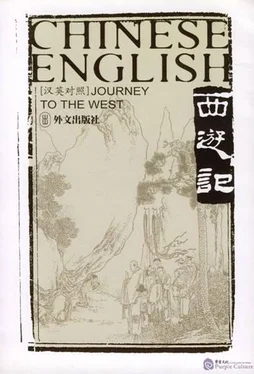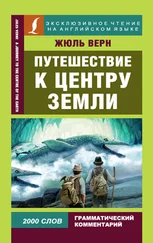Half red, half green, sweet-smelling beauties
Growing every ten thousand years from immortal roots.
The peaches of Wulingyuan seem laughable:
How can they compare with those of Heaven?
Purple-veined and tender, rare even in the sky,
Yellow-stoned, and matchless on earth for their sweetness.
They are able to adapt the body and make it live for ever;
Those lucky enough to eat them are no ordinary beings.
The Buddha put his hands together to thank the Queen Mother, who instructed the fairies and houris to sing and dance again, and their performance met with the praises of the whole assembly. Indeed:
Misty heavenly incense filled the room;
A chaos of heavenly petals and flowers.
Great is the splendour of the jade city and golden gates,
Priceless the strange treasures and rare jewels.
Two by two, coeval with Heaven,
Pair by pair, outliving ten thousand kalpas:
Even if land and sea changed places
They would not be astonished or alarmed.
Soon after the Queen Mother had ordered the fairies and houris to sing and dance, and when wine cups and chopsticks were weaving to and fro, suddenly
A strange scent reached their noses,
Startling the stars and constellations in the hall.
Immortals and the Buddha put down their cups,
Each of them raising their heads to look.
An old man appeared in the middle of the Milky Way
Holding a sacred mushroom.
His gourd contains ten-thousand-year elixir.
On the sacred rolls his name is written Eternal Life.
In his cave Heaven and Earth are free.
In his bottle Sun and Moon were created.
As he wanders around the Four Seas in pure idleness
Taking his ease in the Ten Continents, enjoying the bustle.
When he went to Peach Banquets he often got drunk
But when he came round, the moon was as bright as ever.
A long head, big ears and a short body,
Known as Longevity from the Southern Pole.
The Star of Longevity had arrived. When he had made his greetings to the Jade Emperor and the Buddha he made a speech of thanks.
“When I heard that the monkey fiend had been taken by the Lord Lao Zi to his Tushita palace to be refined I thought that this was bound to restore peace,” he said, “and I never expected he would rebel again. Happily the demon was quelled by the Tathagata, and so when I heard that this feast was being given to thank him I came at once. As I have nothing else to offer I have brought with me purple magic mushrooms, jasper herbs, greenish jade lotus-root, and golden pills of immortality: these I humbly present.” The poem says
Offering the jade louts-root and golden pills to Sakyamuni,
To give him as many years as the grains of sand of the Ganges.
Peace and eternal joy decorate the Three Vehicles;
Prosperity and eternal life make the nine grades of immortals glorious.
Within the gate of No-Phenomena the true Law rules;
Above the Heaven of Nothingness is his immortal home.
Heaven and Earth both call him their ancestor,
His golden body provides blessings and long life.
The Buddha happily accepted his thanks, and after the Star of Longevity had taken his place the wine-cups started to circulate once more. Then the Bare-foot Immortal appeared, kowtowed to the Jade Emperor, and thanked the Buddha.
“I am deeply grateful to you for subduing the monkey fiend with your divine powers. As I have nothing else with which to express my respect, I offer you two magic pears and a number of fire-dates.”
Sweet are the Bare-foot Immortal's pears and dates,
And long will be the life of the Buddha to whom they are offered.
The lotus seat of the seven treasures is as firm as a mountain,
His thousand-golden-flower throne is as gorgeous as brocade.
Coeval with Heaven and Earth-this is no lie;
It is true that his blessings are greater than a flood.
His Western Paradise of leisure and bliss
Truly provides all the long life and blessings one could hope.
The Buddha thanked him too, and telling Ananda and Kasyapa to collect together all the offerings he went over to the Jade Emperor to thank him for the banquet. When all the guests were thoroughly drunk the Miraculous Patrolling Officer reported that the Great Sage had poked his head out.
“It doesn't matter,” the Buddha said, producing from his sleeve a strip of paper on which were written the golden words Om mani padme hum. He gave this piece of paper to Ananda and told him to stick it on the summit of the mountains. The Venerable Ananda took it through the gates of Heaven and pasted it firmly to a square boulder on the top of the Five Elements Mountain. When this was done the mountain sank roots and joined up all its seams. The Monkey King was still able to breathe and he could still stick his hands out and move them. Ananda went back to Heaven and reported that he had pasted the paper in place.
The Buddha then took his leave of the Jade Emperor and all the other deities. When he and his two disciples had gone out through the gates of Heaven his merciful heart moved him to chant a spell ordering a local tutelary god and the Revealers of the Truth of the Five Regions to live on the mountain and keep guard over him. When he was hungry they were to feed him iron pellets, and when he was thirsty they were to give him molten copper to drink. When the time of his punishment was over, someone would come and rescue him. Indeed:
The monkey fiend was bold enough to rebel against Heaven,
But was subdued by the Tathagata's hand.
He endures the months and years, drinking molten copper for his thirst,
And blunts his hunger on iron pellets, serving his time.
Suffering the blows of Heaven, he undergoes torment,
Yet even in the bleakest time a happy fate awaits.
If some hero is ready to struggle for him,
One year he will go to the West in the service of the Buddha.
Another poem goes:
His great power grew as he humbled the mighty,
He used his wicked talents to subdue tigers and dragons.
He stole the peaches and wine as he wandered round Heaven,
Was graciously given office in the Jade Capital.
When his wickedness went too far his body suffered,
But his roots of goodness were not severed, and his breath still rose.
He will escape from the hand of the Buddha,
And wait till the Tang produces a saintly monk.
It you don't know in what month of what year his sufferings ended, listen to the explanation in the next installment.
Our Buddha Creates the Scriptures and Passes on Perfect Bliss
Guanyin Obeys a Decree and Goes to Chang'an
If you try to ask about the dhyana
Or investigate the innumerable
You will waste your life and achieve nothing.
Polishing bricks to make mirrors,
Or piling up snow to turn it into grain-
However many years have you wasted like that?
A hair can contain an ocean,
A mustard-seed can hold a mountain,
And the golden Kasyapa only smiles.
When you are awakened you will surpass the Ten Stages and the Three Vehicles,
And stop the four kinds of birth and the six types of reincarnation.
Who has ever heard, before the cliff of thoughts extinguished,
Under the tree that has no shadow,
The sound of the cuckoo in a spring dawn?
The path by the Cao Stream is dangerous,
The Vulture Peak is high in the clouds:
Here the voice of the ancients was a mystery.
On a cliff ten thousand feet high
Five-leaved lotuses bloom
As scent coils round the shutters of the old palace.
At that time
Your knowledge smashes all the currents of thought;
The Dragon King and the Three Treasures can be seen.
Читать дальше









